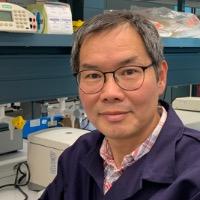
Contact details +6492136593
Associate Professor Xue-Xian Zhang PhD
Associate Professor in Molecular Cell Biology
Doctoral Supervisor School of Natural SciencesMy primary expertise lies in Microbiology, Genetics, and Genomics. Current research in my lab focuses on:
- Molecular and evolutionary mechanims of bacterial adaptation to their natural environments, particularly eukaryotic hosts;
- Experimental evolution of bacterial resistance to copper-containing bactericdes and antibiotics;
- Biofilm formation and its impacts on the control of infectious disease.
Professional
Contact details
-
Ph: (09) 4140800 ext. 41191
Location: 3.08, IC
Campus: Albany
Qualifications
- Doctor of Philosophy - Huazhong Agricultural University (1993)
Research Expertise
Research Interests
The microbiological research conducted in my lab spans from molecular genetics to ecology and evolution, with a specific focus on disease-causing pathogenic bacteria (i.e., Pseudomonas syringae and Pseudomonas aeruginosa).
Thematics
Resource Development and Management, Health and Well-being, Future Food Systems
Area of Expertise
Field of research codes
Biogeography and Phylogeography (060302):
Biological Sciences (060000):
Community Ecology (060202):
Ecology (060200):
Evolutionary Biology (060300):
Evolutionary Impacts of Climate Change (060306):
Genetics (060400):
Microbial Genetics (060503):
Microbiology (060500):
Population Ecology (060207)
Keywords
Microbiology, Experimental Evolution, Infectious Disease, Antimicrobial Resistance
Research Projects
Current Projects
Project Title: Use it or lose it: what determines the regulation mode of a given gene?
Date Range: 2023 - 2026
Funding Bodies: Marsden Fund - Full; Royal Society of New Zealand
Project Team:
- A/Pro Xue-Xian Zhang - Project Leader
Project Title: Isolating and evolving microbial communities to reduce nitrate contamination of water
Date Range: 2019 - 2023
Funding Body: Ministry of Business, Innovation and Employment
Project Team:
- A/Pro Xue-Xian Zhang - Project Leader
Consultancy and Languages
Languages
-
English
Last used: now
Spoken ability: Excellent
Written ability: Excellent -
Chinese
Last used: 2000
Spoken ability: Excellent
Written ability: Excellent
Teaching and Supervision
Teaching Statement
162760, Research Methods and Communication in Biosciences
247712, Advanced Topics in Molecular Biology
162214, Biology of Microorganisms
203203, Biomedicine
203212, Principles of Genetics
203340, Applied Molecular Biology
122231, Genes and Gene Expression
203342, Molecular Cell Biology
122303, Gene Regulation
Current Doctoral Supervision
Main Supervisor of:
-
Hema Rallapati
-
Doctor of Philosophy
The molecular mechanisms of copper homeostasis in plant-associated Pseudomonas
Co-supervisor of:
-
Boying Wang
-
Doctor of Philosophy
Characterisation of acetic acid bacteria and yeast isolated from Kombucha produced in New Zealand -
Indika Serasinghe Mudiyanselage
-
Doctor of Philosophy
Investigation into the development of probiotic starter culture for industrial production of sauerkraut
Completed Doctoral Supervision
Main Supervisor of:
-
2021
-
Kiran Sreeja Jayan
-
Doctor of Philosophy
Investigating the molecular basis of histidine catabolism in a human pathogenic bacterium Pseudomonas aeruginosa PAO1 -
2019
-
~ Naren
-
Doctor of Philosophy
Regulation of histidine catabolism in Pseudomonas fluorescens SBW25
Co-supervisor of:
-
2023
-
Huei-Yi Lai
-
Doctor of Philosophy
The maintenance and evolution of antibiotic resistance genes in the absence of antibiotic selection -
2022
-
Farhad Sadeghpour Golzar
-
Doctor of Philosophy
Experimental Evolution Under Predation in Pseudomonas Fluorescens SBW25 -
2020
-
Amber Paulson
-
Doctor of Philosophy
Temperature- and host-dependent transcriptional responses in the entomopathogenic bacterium, Yersinia entomophaga MH96 -
2015
-
Yunhao Liu
-
Doctor of Philosophy
Molecular mechanism of xylose utilization in a plant growth-promoting bacterium Pseudomonas fluorescens SBW25
Media and Links
Other Links
- Google Scholar - A list of publications with citation data